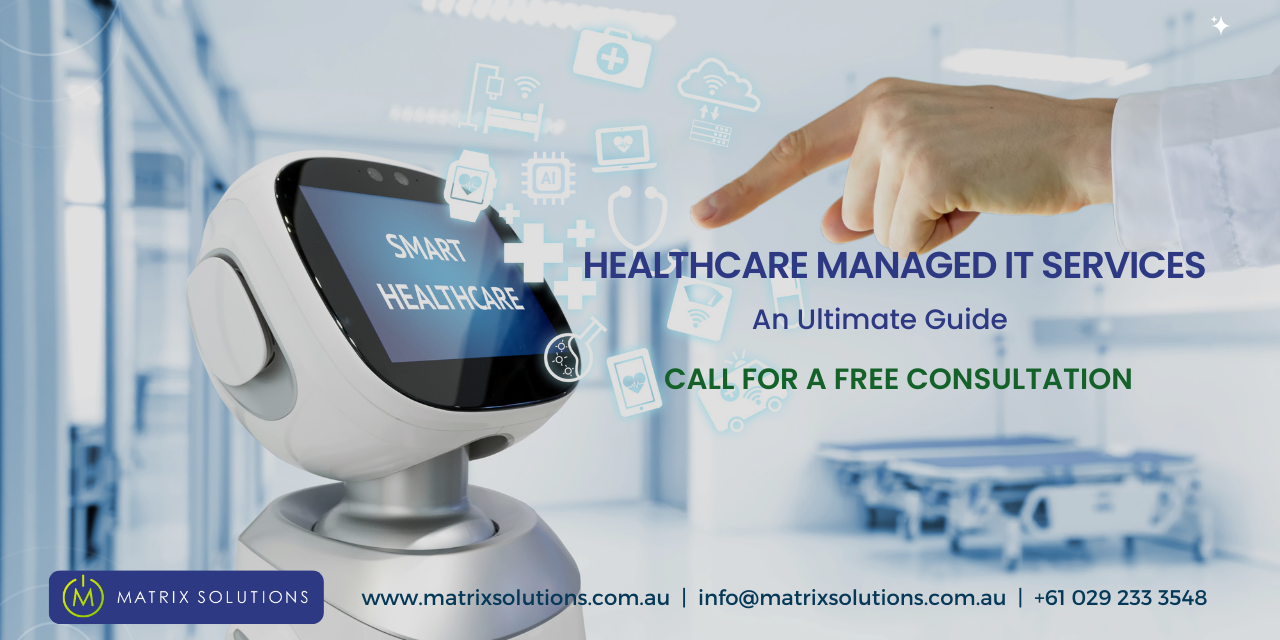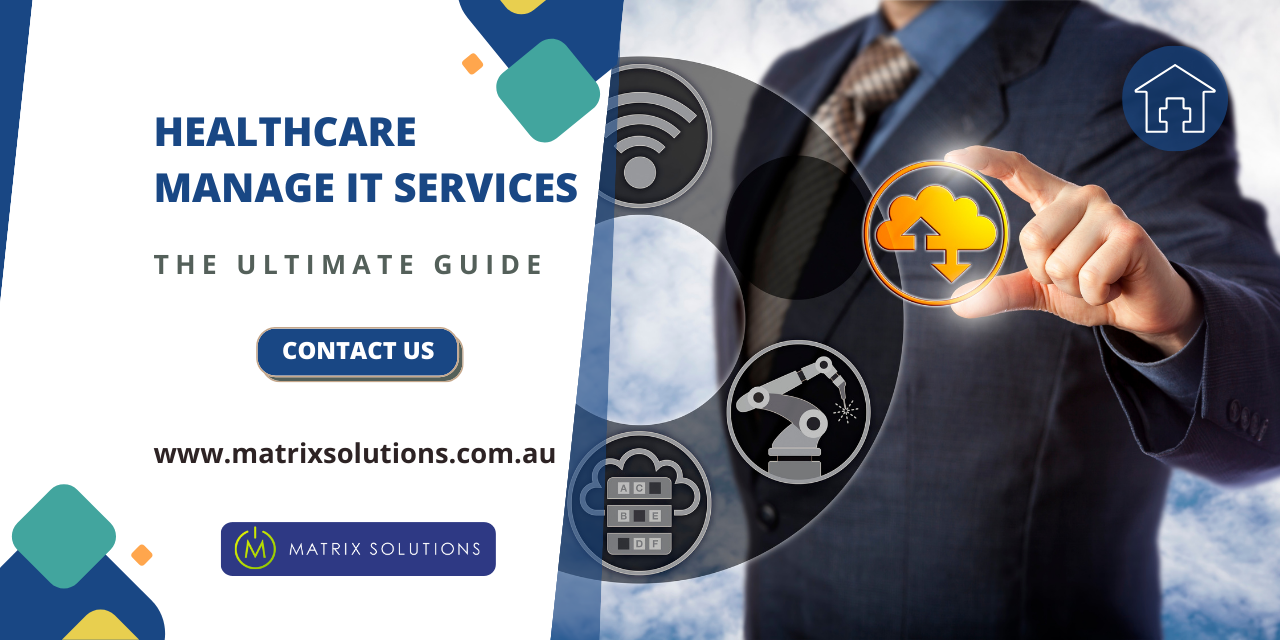The COVID-19 pandemic has significantly impacted the healthcare industry, and managed IT services have emerged as a crucial tool in aiding patient care and hospital management. The healthcare sector has been an early adopter of technology, leveraging it to improve patient outcomes and enhance the quality of care.
In this regard, we provide a comprehensive guide to healthcare managed IT services, covering the current overview, challenges, importance, and types of managed IT services in healthcare.
What are Healthcare Managed IT Services?
Healthcare managed services have become increasingly popular, allowing healthcare organisations to outsource IT services to specialised third-party providers on a contractual or subscription basis.
These managed services help share the burden of the workload with in-house teams, either supplementing them to meet IT demand or replacing them. With the growing demands for improved patient care, streamlined operations, and enhanced security, IT services in healthcare are continuously evolving. Implementing electronic health record ( EHR) systems, data backup strategies, and data archiving ensures readily accessible critical information.
Hence, The significance of healthcare managed IT services is vital in assisting healthcare providers comply with industry regulations. Our offerings guarantee the constant safety and security of patient data, ensuring that your systems remain in compliance with HIPAA standards throughout the entire process, from storage to encryption.

Current Overview of IT Services in Healthcare
Currently, IT services in healthcare are continuously evolving to meet the industry’s demands. Electronic Health Records (EHR) systems have emerged as a central repository for seamlessly sharing patient data among healthcare providers, facilitating coordinated care, and improving accuracy.
The pandemic has accelerated the adoption of telemedicine and remote patient monitoring systems, including remote consultations, virtual visits, and remote patient monitoring. Analysing vast amounts of healthcare data provides insights for better decision-making, personalised treatments, predictive analytics, and population health management.
However, digitising patient records and sensitive data has increased the risk of cyberattacks and data breaches. Healthcare providers are, therefore, investing heavily in robust security measures to protect their data against cyber threats.
The healthcare sector constantly evolves with emerging technologies such as IoT and wearable devices, AI and machine learning, cloud computing, patient engagement tools, blockchain in healthcare, and regulatory compliance and standards. Integrating these IT services remains a priority for healthcare organisations globally.
Managed IT Challenges in Healthcare Organisations
Despite all the benefits of healthcare managed IT services, they also present various challenges. The challenges include:
- Dynamics of Advanced Healthcare Technology
- Data and Incorporated Health Services
- Cybersecurity
- Cost Crisis
- Adopting BYOD (Bring Your Own Device)
- HIPAA Compliance
- Hospital Security
- Non-Compliance with Regulatory Standards
- Healthcare Staffing Challenges
- Disruptive Innovation
Addressing these challenges remains crucial to effectively implementing managed IT services in the healthcare system.
Importance of Managed IT Services in Healthcare
In healthcare, it’s important to have the right system to manage the technology used to provide patient services. It is where managed IT services come in. They help healthcare organisations reduce costs, maintain consistent, high-quality services, and enable scalability and growth.
Reduces Costs
A managed IT system is responsible for acquiring equipment, maintaining workstations, and updating the system. It greatly reduces operational costs while increasing business efficiency and resilience. MSPs offer fixed monthly subscription rates for their IT services, making predicting and scaling operational spending easier.
Maintain Consistency and Quality of Services
The managed service vendor offers top-notch technical support, enabling high-performance technologies to prevent delayed tests, appointments, and treatments while ensuring data privacy and security. Using robust and dependable systems ensures that healthcare workers can focus more on delivering quality service to patients, enhancing overall service and satisfaction.
Enables Scalability and Growth
Managed Service Provider provides cloud-based applications and Software-as-a-Service (SaaS) solutions that enable a flexible and scalable operational infrastructure that can grow as business needs change.
Streamlining Workflows and Automating Repetitive Tasks
Implementing practice management software and other automation tools enables the EHR system to streamline workflows and automate repetitive tasks. It helps healthcare professionals focus on providing patient care and other important tasks instead of spending time on manual data entry or administrative work.
Improving Data Analytics and Business Intelligence
Analysing Key Performance Indicators (KPIs) such as patient outcomes, revenue, and costs allows healthcare organisations to identify areas for improvement and make data-driven decisions that can improve efficiency and productivity. We can achieve this through improved data analytics and business intelligence.
Increased Security and Compliance
MSPs ensure increased security and compliance by protecting healthcare organisations’ IT infrastructure from malicious attacks. They must comply with regulatory requirements such as the General Data Protection Regulation (GDPR) and other data privacy laws to ensure that healthcare data is protected and secure.
Types of Healthcare Managed IT Services
Managed IT services have become indispensable to healthcare institutions in today’s fast-paced and ever-evolving healthcare industry. IT vendors offer various services to help hospitals and healthcare providers maintain an efficient and seamless IT infrastructure. Here are some of the most common types of managed IT services in the healthcare sector:
A. Electronic Health Records (EHR) Management
Electronic Health Record (EHR) Management is a system that stores essential patient medical information in a database. The system helps medical institutions transition to a paperless environment, creating a highly collaborative system within the organisation. It provides interfaces and various functionalities to healthcare facilities, whether large or small.
EHR is widely used for accessing digital medical information, clinical assessments, diagnoses, medical imaging, pathology results, and various specialist assessments.
B. Network Security and Data Privacy
Data privacy and network security are critical aspects of healthcare. Safeguarding patients’ data by implementing and managing security measures is essential. Managed security service providers (MSPs) possess the knowledge and expertise to identify and mitigate potential security threats and vulnerabilities in the healthcare industry.
The service providers implement proactive measures, such as firewalls, intrusion detection systems, and encryption technologies, to protect patient information from unauthorised access.
C. IT Infrastructure Management
IT infrastructure management monitors and maintains the IT infrastructure to ensure that the organisation uses the best resources, protects against threats, and monitors key aspects of local and cloud-based service utilisation.
Ensuring the proper functioning of IT infrastructure is essential to provide uninterrupted healthcare services to patients and maintain the hospital’s daily operations.
D. Cloud Solutions in Healthcare
Cloud computing in healthcare is implementing remote servers accessed via the Internet to store, manage, and process healthcare-related data. Cloud computing allows healthcare organisations to store, manage, and access patient data. It clears the path for increased IoMT, telemedicine, AI/ML, and data interoperability projects in healthcare.
Most hospitals and healthcare organisations primarily use private cloud models.
What to Look for in Healthcare Managed IT Service Providers
In the healthcare industry, managed IT services have become increasingly popular to support digital transformation, mitigate cyber threats, and streamline IT operations. However, choosing the right managed IT service provider can be daunting. In this context, it is essential to consider some key factors while selecting a managed IT service provider.
HIPAA Compliance
Health Insurance Portability and Accountability Act ( HIPAA) is a crucial factor to consider. It mandates strict security and privacy standards for patient health information. Therefore, healthcare organisations must choose an MSP that abides by HIPAA and can help maintain compliance with effective and proven security measures.
Ongoing and Proactive Support
Ongoing and proactive support is essential for efficient and effective service delivery. Managed IT service providers should offer 24/7 proactive support and utilise monitoring tools and analytics to monitor system health and prevent future problems.
Security and Business Continuity
Security and business continuity are also important factors to consider. Top-tier managed IT service providers offer proactive monitoring and prompt support when emergencies arise. Choosing a service provider that maintains the latest security protocols to address exposure and mitigate cyber threats is crucial.
Collaboration and Customisaiton
Collaboration and customisation are key factors to consider. The best service provider will always collaborate and deliver customised services that meet the business’s unique needs. The main goal of managed IT services for healthcare companies is to probe pain points and challenges, using information to create a strategy tailored to the needs of the business.
How do Healthcare Organisations Use Managed IT Services to Overcome Their Challenges?
The healthcare industry is rapidly evolving, and organisations are looking to accelerate their digital transformation to meet the growing needs of patients. However, they face challenges such as tight budgets, cyberattack risks, complex data centre modernisation, cloud migration, scarce workforce, and higher patient expectations that significantly strain their IT teams.
To overcome these challenges, many healthcare organisations have adopted managed IT services. These services include Virtual CIOs, managed cloud services, managed security services, cyber-security services, NetDocuments, IT consulting and strategy services, outsourced IT services, and more. By leveraging these services, healthcare organisations can streamline operations, reduce costs, and enhance their IT infrastructure.
A Virtual CIO can provide the expertise and guidance needed to develop a comprehensive IT strategy that aligns with the organisation’s goals and objectives. Cloud services can help healthcare organisations store and manage patient data securely, while managed security services can protect against cyber threats and ensure compliance with regulatory requirements.
Worldox and NetDocuments are document management systems that can help healthcare organisations manage their files and documents effectively. IT strategy consulting can help healthcare organisations evaluate their current IT infrastructure and identify areas for improvement.
In short, healthcare organisations are turning to managed IT services such as Matrix Solutions to overcome the challenges they face in today’s digital landscape. By leveraging the expertise and resources of managed service providers, healthcare organisations can improve their IT infrastructure, enhance patient care and safety, and achieve their business goals.
Read our latest blog to discover 7 Benefits of Managed IT Services for Accounting Firms
Optimise Your IT Infrastructure!
Discover the Key to Efficiency and Success With Matrix Solutions’ Managed IT Services.







